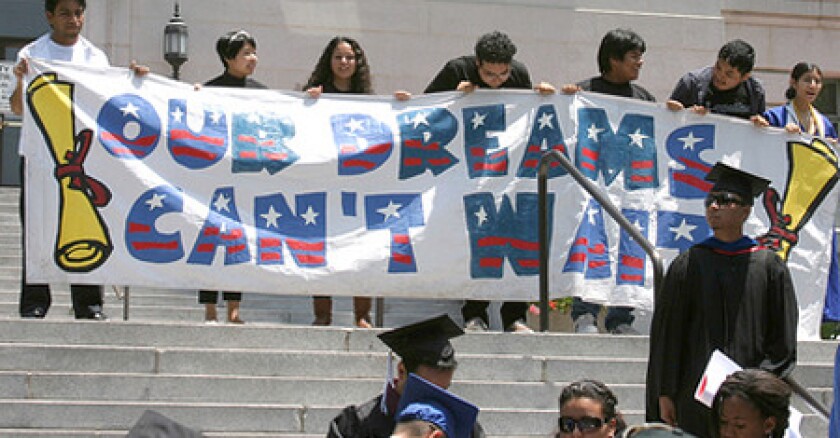When university leaders support offering reduced tuition rates for in-state undocumented immigrants -- but their political representatives do not -- going rogue might present an easier alternative than lobbying lawmakers. The legality of such a move, however, hasn't been fully tested yet.
Even before Maryland voters approved their tuition-equity law by referendum in November, Montgomery College offered a reduced tuition policy for undocumented immigrants. The community college -- located just outside of Washington, D.C. -- granted an in-county annual rate, plus fees, of $3,561 for a full-time student in 2012, which is substantially cheaper than the $9,379 for students from outside the state.
“It was always a matter of access,” said Elizabeth Homan, a spokeswoman for Montgomery College. “Some of these amazingly talented undocumented students got into other schools, but paying out-of-state rates was cost-prohibitive, and we were the most affordable option. We always believed that everyone deserved an opportunity to attend and achieve a higher education degree.”
University boards that pass discounted tuition policies for undocumented immigrants typically cite the moral impetus of allowing all young people the same opportunities granted by a college education. But in states where tuition equity isn’t the law of the land, it can also be a marketing strategy to attract more students.
Last summer, the Metropolitan State University of Denver (MSU) established a differentiated nonresident policy that charges $7,157 per year for a full-time student -- higher than its in-state rate of $4,304 but lower than its out-of-state rate of $15,985. Of the 237 students enrolled at the differentiated rate last fall, 137 were new students, according to Judi Bonacquisti, associate vice president of enrollment services at the college.
Bonacquisti said the college’s board of trustees had long hoped the Colorado General Assembly would codify an in-state tuition policy for undocumented immigrants who graduated from Colorado high schools, but proposals kept stalling. This year, lawmakers did pass a bill in March that awaits Gov. John Hickenlooper’s signature. But by acting early, MSU Denver won itself free publicity as the only college in Colorado with discounted tuition for undocumented immigrants.
“I think it’s brought us a lot of goodwill,” Bonacquisti said.
Recently, an entire university system in Hawaii decided to try the same approach. In February, the University of Hawaii Board of Regents opted to grant in-state tuition to undocumented immigrants at all three state universities and seven community colleges.
After a tuition-equity bill stalled in Hawaii's state Senate in the 2011-2012 legislative session, the chair of the Senate Education committee, Sen. Jill Tokuda, told the university to stop waiting for lawmakers’ endorsement and go forward with its own policy on the issue.
“Some people just assume that going to statute is the only possible way,” Tokuda said. But, she argues, Hawaii state law already empowers the university board of regents to waive or reduce the tuition fee for both resident and nonresident students.
Not everyone agrees that universities can grant in-state tuition to undocumented immigrants without the legislature’s explicit backing. Judicial Watch, a conservative government watchdog group, filed a lawsuit in 2011 (which was later dismissed) challenging Montgomery College’s immigrant tuition policy.
“It’s not right,” said Tom Fitton, president of Judicial Watch. “These are benefits that are not available to legal citizens of other states.”
Judicial Watch argued that state and local public benefits, including subsidized secondary education, aren’t legally available to undocumented immigrants unless explicitly provided by state law. The Maryland Court of Appeals dismissed the case last December after voters approved a state DREAM act, making the question moot.
Colorado Attorney General John Suthers released a legal opinion in June 2012 making the same argument about MSU Denver’s discounted rate for undocumented immigrants.
“State-supported institutions of higher education in Colorado cannot act unilaterally. Under federal law, they must await a decision by the legislature,” he said in a written statement.
Despite that interpretation, Suthers and other critics in Colorado decided not to mount a legal challenge. So far, no one has sought to test Hawaii’s policy in court either.









